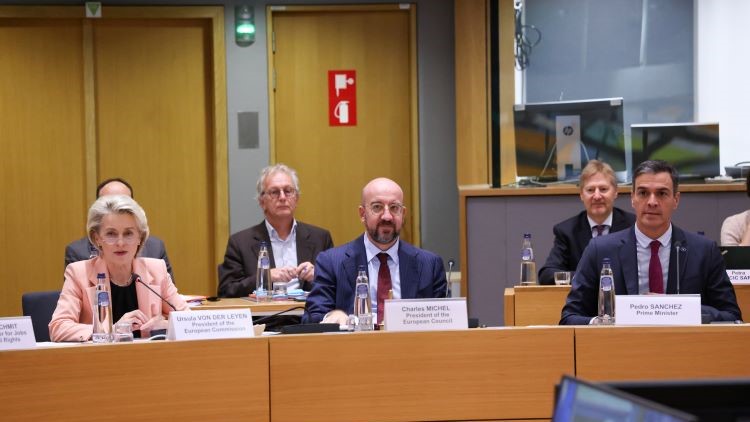Eduardo González
The acting President of the Government, Pedro Sánchez, yesterday took advantage of his participation in the EU Tripartite Social Summit to take stock of the “social dimension” of the Spanish Presidency, which, “after the halfway point, is positive in many areas.”
The Tripartite Social Summit is a forum for dialogue between EU institutions meeting yesterday in Brussels under the motto Laying the pillars of a fruitful European economy for workers and companies. The meeting was attended by Pedro Sánchez, on behalf of the current Presidency of the Council of the EU; the president of the Commission, Úrsula von der Leyen; the president of the European Council, Charles Michel; and the social partners and business associations of Europe. On behalf of Spain, the Minister of Labor and Social Economy and acting second vice president of the Government, Yolanda Díaz, also attended.
“One of the four priorities of the Spanish Presidency of the Council of the European Union is to promote greater social and economic justice,” Sánchez declared during his speech. “This requires more intense efforts to advance the initiatives and objectives set out in the Action Plan of the European Pillar of Social Rights,” he continued.
Likewise, Sánchez expressed Spain’s “will to continue reinforcing the social dimension” of the EU Presidency and assured that, “after the halfway point, the balance is positive in many areas”, with special mention to the adoption of the Council Recommendation for the Development of a Social Economy or the decision relating to guidelines for the employment policies of the Member States
At the legislative level, he assured that Spain’s will is to “devote all necessary efforts” to try to move forward and close agreements with the European Parliament on the directive on working conditions in platform work, as well as the coordination regulation on the matter. of social security or the directive on the European Disability Card.
Likewise, Pedro Sánchez highlighted the need to strengthen the pillars of the European economy, ensuring that “the double digital and ecological transition” can only be addressed by guaranteeing that workers, the unemployed and companies “can have the necessary skills.” To this end, he highlighted the importance of qualifying workers, especially in sectors that are currently undergoing transformation and that have a high potential in terms of job creation.
During the meeting, participants addressed issues such as labor shortages, the implementation of an industrial and energy policy “for a prosperous Europe that generates quality employment and sustainable growth” and the response to the Inflation Reduction Law. of the United States.
“The European Union is determined to become an industrial, technological and commercial power and that means reducing our external dependencies in critical areas, such as digital and net-zero technologies and raw materials,” declared Charles Michel. “As we adapt to the ecological, digital and demographic transitions, we must ensure that our economies remain fair, resilient, competitive and sustainable,” he added.
For her part, Von der Leyen warned that “we need to improve access to the labor market and help workers acquire the skills they need”, as well as “simplify rules for companies to boost the EU’s competitiveness”. “Only by working together, side by side with the social partners, can we guarantee quality jobs and sustainable and inclusive growth,” she concluded.







